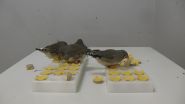(Press-News.org) When does aging really begin? Two Northwestern University scientists now have a molecular clue. In a study of the transparent roundworm C. elegans, they found that adult cells abruptly begin their downhill slide when an animal reaches reproductive maturity.
A genetic switch starts the aging process by turning off cell stress responses that protect the cell by keeping important proteins folded and functional. The switch is thrown by germline stem cells in early adulthood, after the animal starts to reproduce, ensuring its line will live on.
While the studies were conducted in worms, the findings have implications for humans, the researchers report. The genetic switch and other components identified by the scientists as playing a role in aging are conserved in all animals, including humans, offering targets for future study. (C. elegans has a biochemical environment similar to that of humans and is a popular research tool for the study of the biology of aging and as a model of human disease.)
Knowing more about how the quality control system works in cells could help researchers one day figure out how to provide humans with a better cellular quality of life and therefore delay degenerative diseases related to aging, such as neurodegenerative diseases.
"Wouldn't it be better for society if people could be healthy and productive for a longer period during their lifetime?" said Richard I. Morimoto, the senior author of the study. "I am very interested in keeping the quality control systems optimal as long as we can, and now we have a target. Our findings suggest there should be a way to turn this genetic switch back on and protect our aging cells by increasing their ability to resist stress."
Morimoto is the Bill and Gayle Cook Professor of Molecular Biosciences and director of the Rice Institute for Biomedical Research in Northwestern's Weinberg College of Arts and Sciences.
The study, built on a decade of research, will be published in the July 23 issue of the journal Molecular Cell. Johnathan Labbadia, a postdoctoral fellow in Morimoto's lab, is the first author of the paper.
In C. elegans, the decline begins eight hours into adulthood -- all the switches get thrown to shut off an animal's cell stress protective mechanisms. Morimoto and Labbadia found it is the germline stem cells responsible for making eggs and sperm that control the switch.
In animals, including C. elegans and humans, the heat shock response is essential for proper protein folding and cellular health. Aging is associated with a decline in quality control, so Morimoto and Labbadia looked specifically at the heat shock response in the life of C. elegans.
"We saw a dramatic collapse of the protective heat shock response beginning in early adulthood," Morimoto said.
Morimoto and Labbadia found the genetic switch occurs between two major tissues in an organism that determine the future of the species: the germline and the soma (the body tissues of the animal, such as muscle cells and neurons). Once the germline has completed its job and produced eggs and sperm -- necessary for the next generation of animals -- it sends a signal to cell tissues to turn off protective mechanisms, starting the decline of the adult animal.
"C. elegans has told us that aging is not a continuum of various events, which a lot of people thought it was," Morimoto said.
"In a system where we can actually do the experiments, we discover a switch that is very precise for aging," he said. "All these stress pathways that insure robustness of tissue function are essential for life, so it was unexpected that a genetic switch is literally thrown eight hours into adulthood, leading to the simultaneous repression of the heat shock response and other cell stress responses."
Using a combination of genetic and biochemical approaches, Morimoto and Labbadia found the protective heat shock response declines steeply over a four-hour period in early adulthood, precisely at the onset of reproductive maturity. The animals still appear normal in behavior, but the scientists can see molecular changes and the decline of protein quality control.
In one experiment, the researchers blocked the germline from sending the signal to turn off cellular quality control. They found the somatic tissues remained robust and stress resistant in the adult animals.
"This was fascinating to see," Morimoto said. "We had, in a sense, a super stress-resistant animal that is robust against all kinds of cellular stress and protein damage. This genetic switch gives us a target for future research."
The title of the paper is "Repression of the Heat Shock Response Is a Programmed Event at the Onset of Reproduction."
INFORMATION:
Highly-social zebra finches learn foraging skills from their parents. However, new research has found that when juvenile finches are exposed to elevated stress hormones just after hatching, they will later switch strategies and learn only from unrelated adult birds - ignoring their parents' way of doing things and instead gaining foraging skills from the wider network of other adult finches.
Researchers say that spikes in stress during early development may act as a cue that their parents are doing something wrong, triggering the young birds to switch their social learning ...
If you find yourself downing that extra piece of chocolate fudge cake even though you're not hungry, it might be the absence of a hormone in your brain that's causing you to overeat purely for pleasure.
In a new Rutgers Robert Wood Johnson Medical School study published in Cell Reports, researchers found that when the hormone glucagon like peptide-1 (GLP-1) was reduced in the central nervous system of laboratory mice, they overate and consumed more high fat food.
"The mice in which the GLP-1 deficiency was induced ate beyond the need for calories and showed an increase ...
A new study by researchers at University of California, San Diego School of Medicine reveals a protein's critical - and previously unknown -- role in the development and progression of acute myeloid leukemia (AML), a fast-growing and extremely difficult-to-treat blood cancer.
The finding offers a novel target for better treating AML, and possibly other cancers, by cutting off the ability of tumors to access nearby cellular players that feed its growth. The study was published July 23 in Cell Stem Cell.
"The work really focuses on trying to understand the dependence ...
Alexandria, VA - EARTH Magazine takes you to Le Mans, France, to cover how the World Endurance Competition (WEC) race series is transforming automotive efficiency in both high-performance racing and the commercial automotive industries. EARTH's latest feature explores the science behind efficiency upgrades used by three major racing competitors: Porsche, Audi and Toyota.
Using physics and cutting-edge materials results in a "fascinating case study of how unbridled competition can produce unique, innovative and extraordinary solutions to engineering barriers once thought ...
CHAPEL HILL, NC (July 23, 2015) - For years, a crisis has been brewing in molecular biology. The problem is that antibodies--research tools used to identify key proteins at work in a cell--aren't always what they seem. Unreliable antibodies have led to numerous instances of false findings, failed experiments, and wasted money and samples.
Enter the Histone Antibody Specificity Database, a newly launched online portal that lets scientists find the right antibodies for their research with a much higher degree of confidence than ever before. Rather than relying on the claims ...
It's well known that being socially connected promotes a person's overall and psychological health. A new study from the University of Rochester now shows that the quantity of social interactions a person has at 20--and the quality of social relationships that person has at age 30--can benefit her well-being later in life.
People with poor social connections have been shown to be at an increased risk for early mortality. "In fact," said lead author Cheryl Carmichael, who conducted the research as a PhD candidate in psychology at the University of Rochester, "having ...
Astronomers using the Karl G. Jansky Very Large Array (VLA) have discovered jets of material ejected by still-forming young brown dwarfs. The discovery is the first direct evidence that brown dwarfs, intermediate in mass between stars and planets, are produced by a scaled-down version of the same process that produces stars.
The astronomers studied a sample of still-forming brown dwarfs in a star-forming region some 450 light-years from Earth in the constellation Taurus, and found that four of them have the type of jets emitted by more-massive stars during their formation. ...
Chemotherapy for patients with end-stage cancer was associated with worse quality of life near death for patients with a good ability to still perform many life functions, according to an article published online by JAMA Oncology.
Physicians have voiced concerns about the benefits of chemotherapy for patients with cancer who are nearing death. An American Society of Clinical Oncology (ASCO) expert panel has called chemotherapy use among patients for whom there was no evidence of clinical value the most widespread, wasteful and unnecessary practice in oncology.
Holly ...
PHILADELPHIA - Physicians in training are twice as likely to order a costly brand-name statin (used to lower blood cholesterol levels) when supervised by senior physicians who prefer those medications in their own practice, according to a new study led by researchers at the Perelman School of Medicine at the University of Pennsylvania and published online in the Journal of General Internal Medicine. These findings document a link between low-value prescribing and graduate medical training, which physicians undergo after completing medical school but before they can practice ...
If oxygen was a driver of the early evolution of animals, only a slight bump in oxygen levels facilitated it, according to a multi-institutional research team that includes a Virginia Tech geoscientist.
The discovery, published Wednesday in the journal Nature, calls into question the long held theory that a dramatic change in oxygen levels might have been responsible for the appearance of complicated life forms like whales, sharks, and squids evolving from less complicated life forms, such as microorganisms, algae, and sponges.
The researchers discovered oxygen levels ...

